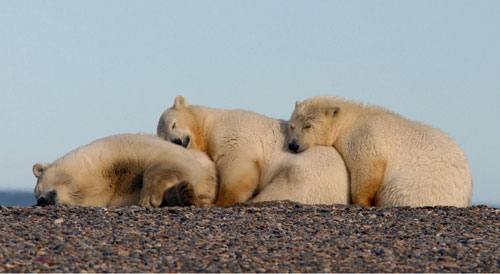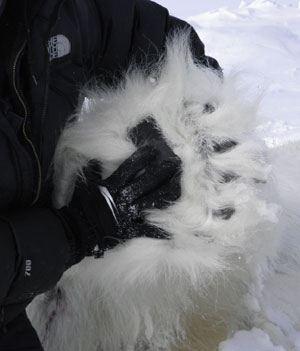
Polar Bears in the Chukchi Sea Doing Well, Despite Sea Ice Loss
August 27, 2013
Polar bears The Chukchi Sea population (also called the Alaska-Chukotka population) lives west of Alaska on the sea ice of the northern Bering, Chukchi, and eastern Siberian seas. Because this area is harsh, remote, and vast—more than one and a half times the size of Texas—information on the bears that live there has been limited. In 2008, the Service began new research to fill this gap. The project continues today in collaboration with the U.S. Geological Survey (USGS) and State of Alaska, and is also supported by government, Native, and industry partners in western Alaska.
The first results will appear in an upcoming issue of Global Change Biology. The study finds that body condition (i.e., the size and fatness) and reproductive rates of Chukchi Sea bears remained stable or improved over the past 20 years, despite large sea ice declines. Also, Chukchi Sea bears currently have better body condition and higher reproduction than their neighbors in the southern Beaufort Sea, north of Alaska, where the USGS has studied bears for over 30 years. Although diets were similar for the two populations, the Chukchi Sea bears had greater access to food in the spring. The positive status of Chukchi Sea bears - compared to historic data for the same region and current data for its neighbor—may be due to high biological productivity, the status of prey populations, or a shorter history of sea ice declines than in the southern Beaufort Sea. Although caution is warranted, this study suggests that the population is doing well and capable of supporting a sustainable harvest. It also supports recent progress toward long-term conservation. In 2010, the first-ever limits on subsistence harvest were set for the Chukchi Sea population under an international treaty with Russia. The Service is working with the Alaska Nanuuq Commission and other partners in western Alaska to implement these limits in the next few years. According to Service biologist Dr. Eric Regehr, a coauthor on the study, “This is a bright light on what can seem like a dim horizon for polar bears. We have a great opportunity to protect both animals and traditional subsistence practices. Federal and Native partners working together like this, is the only way to prepare for the challenges that climate change will bring”.
On the Web:
Source of News:
E-mail your news &
photos to editor@sitnews.us
|
|||

